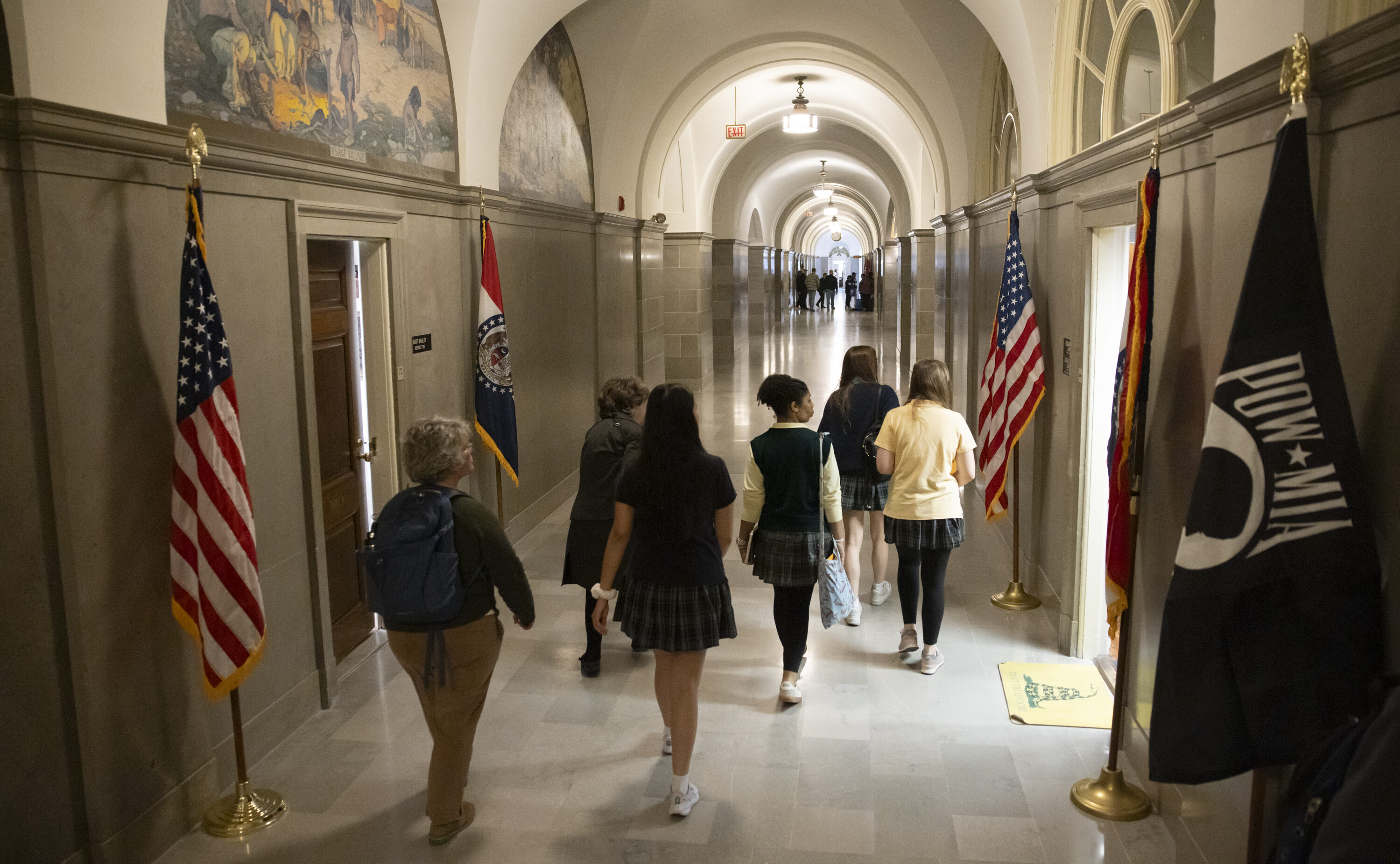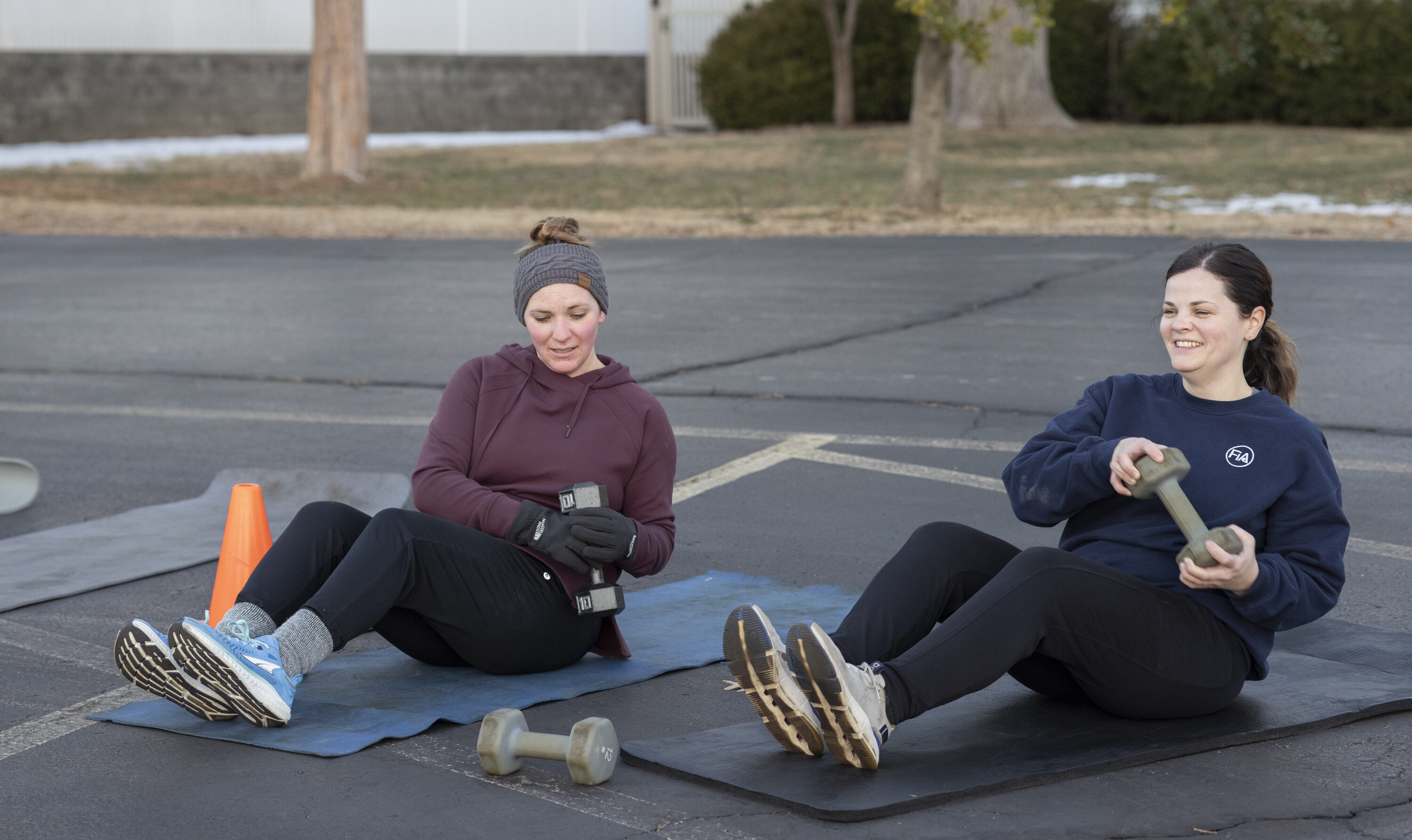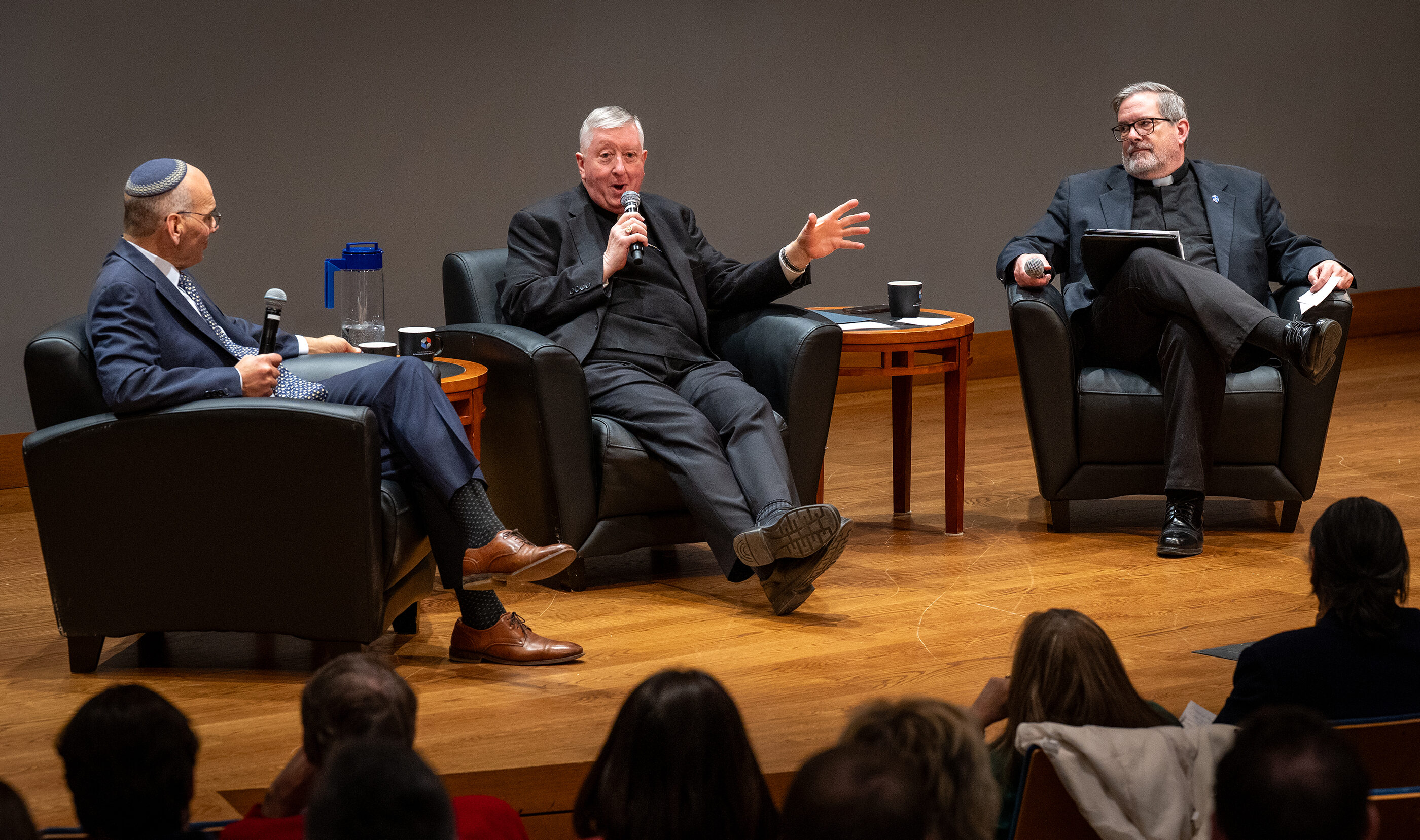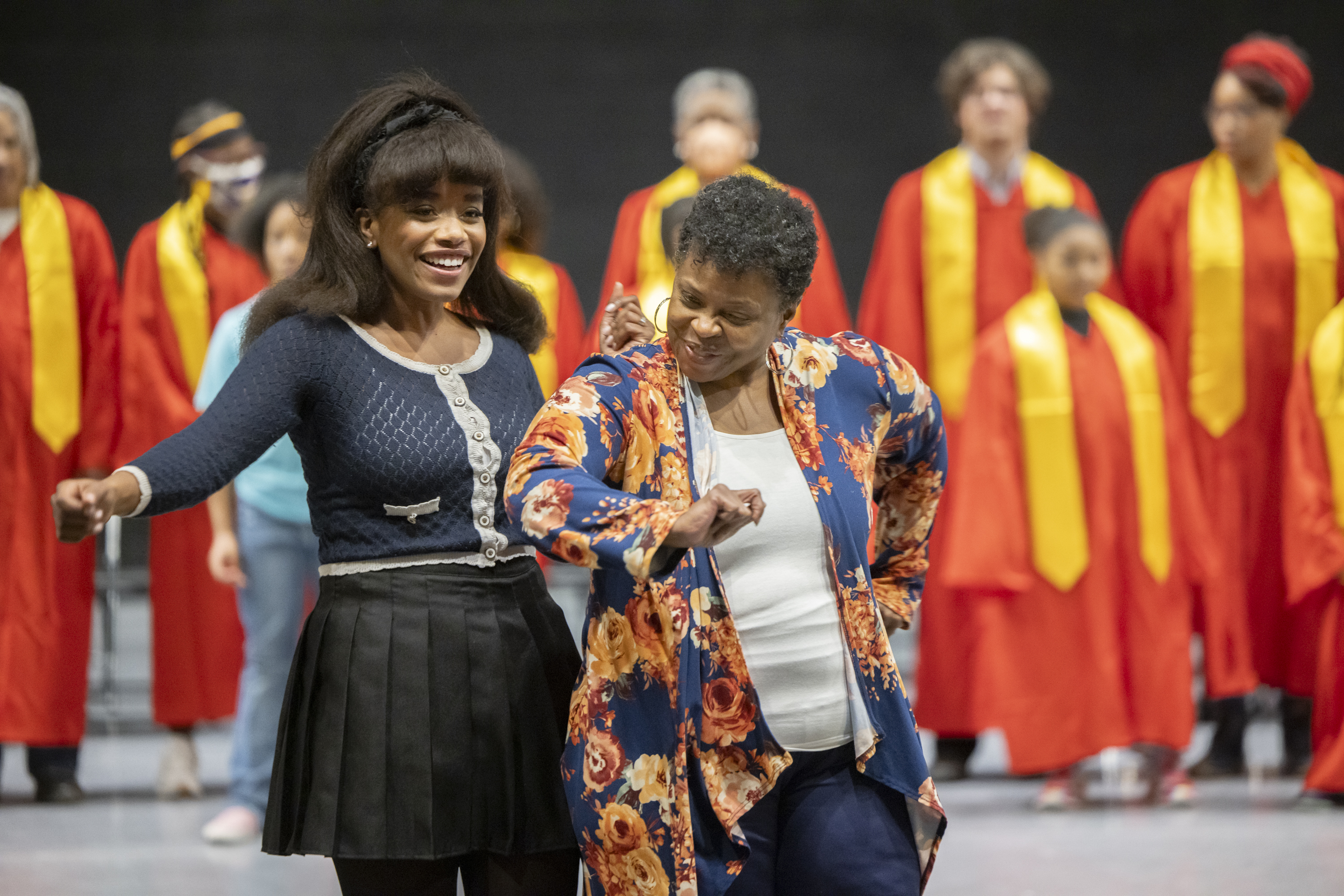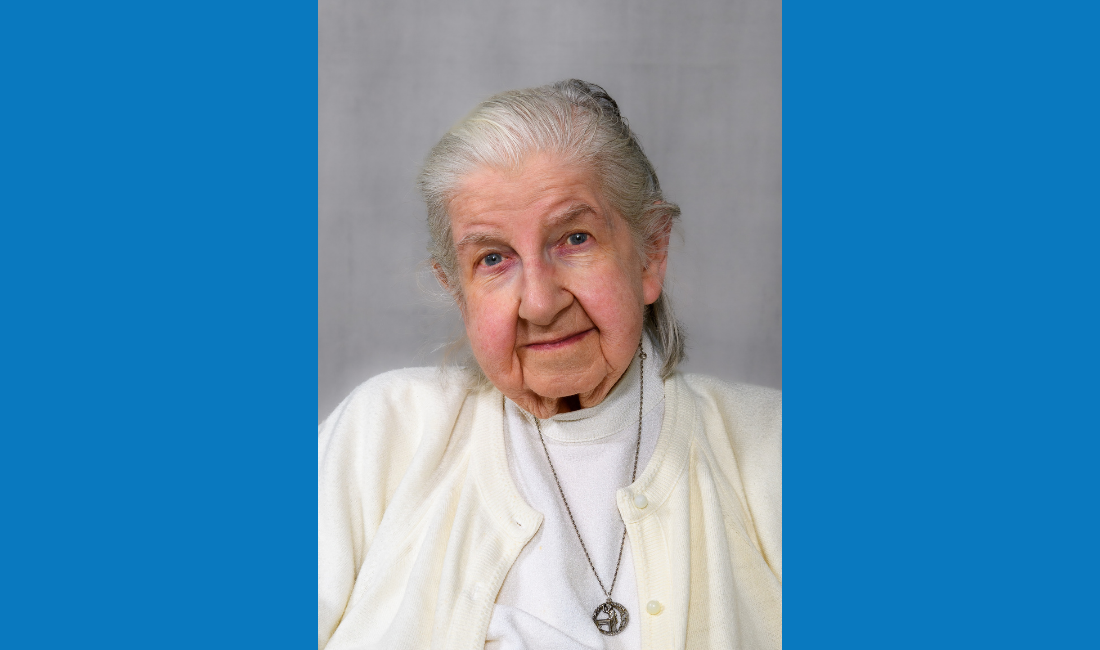A shoe repairman with a ‘servant’s heart’
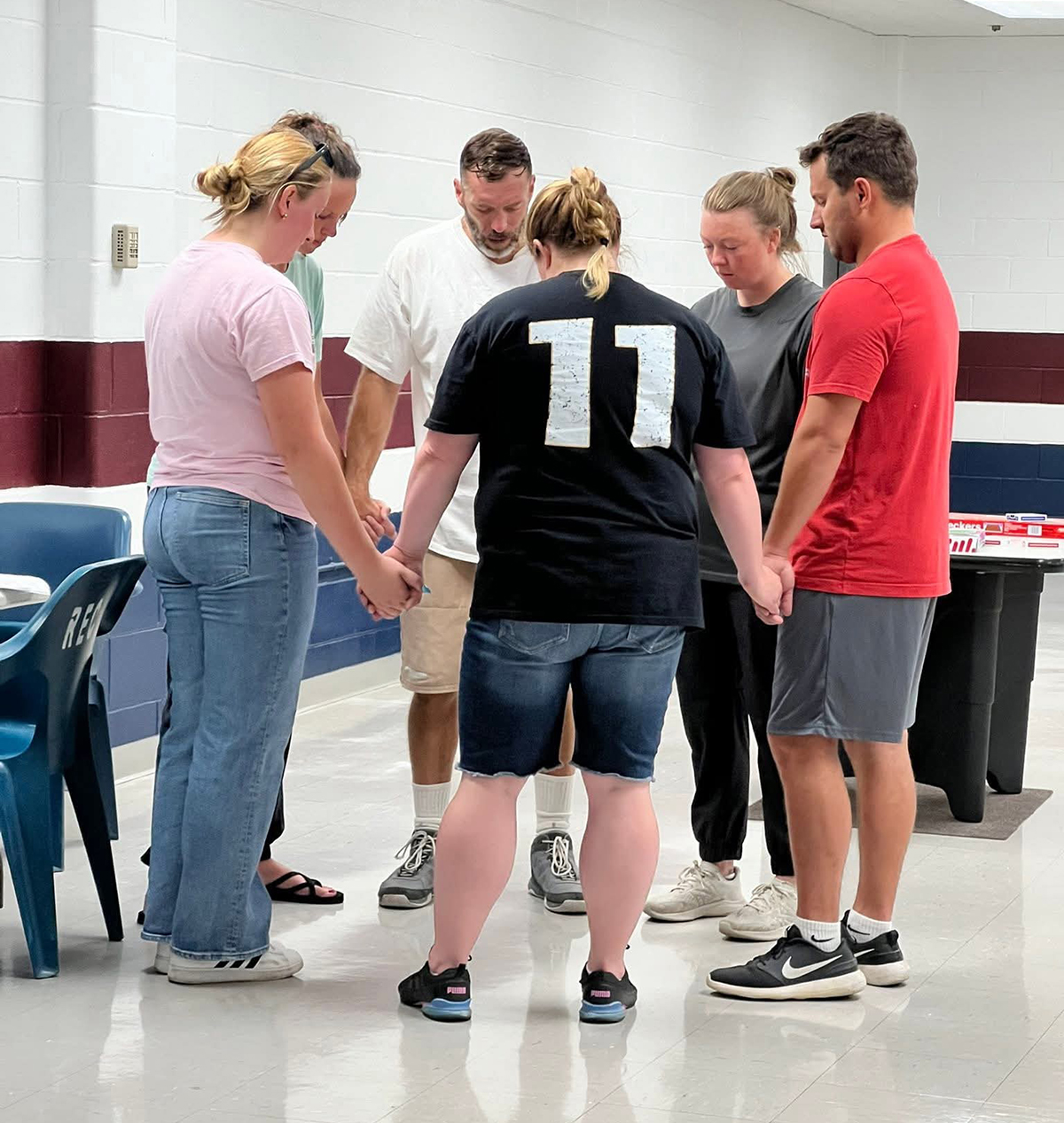
Awaiting execution, Lance Shockley prays for more time to ‘recount the deeds of the Lord’
The first time Jeff Kohler met Lance Shockley, Shockley was repairing shoes.
Kohler, a parishioner at St. Margaret Mary Alacoque in south St. Louis County, had recently started serving in prison ministry at Potosi Correctional Center. Shockley worked in the recreation area and made a habit of fixing his fellow inmates’ shoes when they tore or started to separate from the sole.
“Not only did he do a great job, but he was so kind about it,” Kohler said. “I think he used that as kind of a way to talk to people and maybe help them get closer to Jesus.”
Shockley was convicted of the 2005 killing of Missouri State Highway Patrol Sgt. Carl Graham Jr. in Carter County. He was sentenced to death by a judge after the jury deadlocked — a practice allowed only in Missouri and Indiana — and his execution is scheduled for Oct. 14. Shockley has maintained his innocence.
Shockley’s is the first execution scheduled under the administration of Gov. Mike Kehoe, a Catholic. The Catechism of the Catholic Church teaches that the death penalty is inadmissible in all cases because it is a violation of a person’s inherent dignity (CCC 2267).
Over the past decade and a half, Catholics serving in prison ministry have come to know Shockley not for the crime for which he was convicted, but for his faith in Christ and his ability to share it with others.
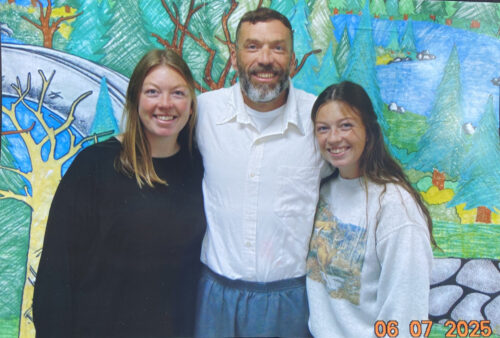
Summer Shockley, left, and Morgan Shockley visited their father, Lance Shockley, at Potosi Correctional Center in June 2025.
“His servant’s heart, his listening skills are just unbelievable,” Kohler said. “It’s obvious that he’s there to help others and bring them to Christ.”
It started with a Kairos retreat.
Shockley participated in the first Kairos Prison Ministry International retreat at Potosi Correctional Center in 2010, a four-day event that includes spiritual talks, personal testimonies and small group sharing.
At the end of the retreat weekend, the men are invited to share with the group what the experience meant to them. Shockley found himself too deeply moved to put words to it.
“I’d been locked up for four years in county jail, waiting on trial, and just to experience the kind of love that these people were showing, unconditional — I just hadn’t received that in a while and didn’t know if I’d ever receive it again, being in prison and being separated from my loved ones,” he said in a phone interview earlier this month.
Shockley had been at a “spiritual rock bottom,” he said, and reached a point where he was ready to yield to God. His way of living hadn’t worked out, and he was ready to try following God’s will instead.
The retreat team “showed me there’s goodness in the world, and you don’t have to make a bad situation worse — you can rise above this,” he said. “And I just learned that I was a leader, an encourager. It just came natural to me, and I had been holding that back. Like in the Bible, where it says a city on a hill can’t be hidden.”
After the retreat, Shockley dove into the Scriptures. He began regularly attending a Christian church service. As the years passed, he started leading Bible studies and was elected president of the prison’s Restorative Justice Organization and the designated Christian representative for the group Christians at Potosi.
Most of his ministry, as he calls it, happens in day-to-day interactions and friendships with his fellow inmates, Shockley said.
“The first conversation might not be about God. It might be like, ‘Hey, do you need anything? Do you need a pair of shoes? Do you need deodorant? Do you need toothpaste?’ And just be somebody that they meet, because somebody’s going to influence them, and I want to be one of the those guys that they first see,” he said. “…I can get them involved in classes that I teach, and the Bible studies, and because I’ve been here so long, if they’re willing, to improve their lives and help them become the men God created them to be. It’s never too late for that.”
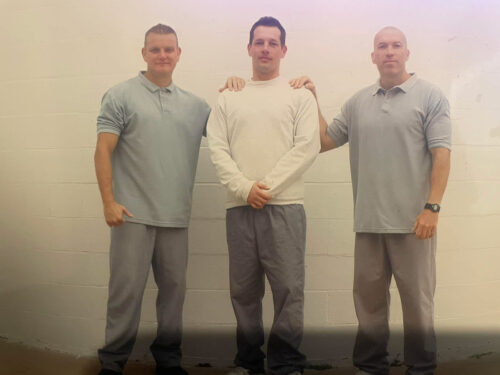
Michael Doak, center, met Lance Shockley, right, while incarcerated at Potosi Correctional Center in 2021.
That’s how Michael Doak met Shockley in 2021. By then, Doak had been in and out of lower-level prisons for years. Addicted to heroin, he had been involved in a prison riot and was sent to maximum-security Potosi Correctional Center, where a mutual friend introduced him to Shockley.
Doak, drawn to Shockley’s friendly manner and openness on the softball field, started regularly spending his recreation time there, asking him questions and talking about life.
“He mentored me and took me under his wing — he did that with a lot of people,” Doak said. “He just kind of taught me how to be a man, how to carry myself as a productive member of society, how to keep my word. And he preached to me.”
Doak had been without a positive male role model in his life for a long time, he said. “It was just the interactions I had with him, the way he carried himself and spoke to people and really cared about other people, with what he had on his plate with his sentencing and everything — it didn’t really matter to him, he just wanted to reach out and help people.”
Doak was released in November 2022, and he’s stayed clean since. He has a steady job; a wife; custody of one daughter and is working on getting partial custody of the other.
He credits the change in his life to Shockley, who continues to call him about once a week to check in and “help me stay on the right track,” Doak said. “We talk about God a lot. He talks about not being petty with people, little things like that to improve myself. He talks about being good to people, how I can be better, how proud he is of me.”
“He tells me to forgive people, to not hold grudges. He talks Scripture to me in a way that makes sense,” he added.
Fourteen years after his own Kairos experience, Shockley approached the retreat team and asked to be a server on an upcoming retreat, working in the background to help with food service, praying with team members and other duties to keep the weekend running smoothly. The team agreed, then asked him to give the closing talk, too.
Shockley shared how God had transformed his life “from being entirely self-centered into a man that desires to put others’ interests before his own.” God’s strongest desire is to love us and be near to us, he told the men.
“Kairos brothers and sisters, we now share a responsibility. The kindness and love we have been shown must be reciprocated to others. We are being called to give back to whom we can. We are motivated to pay it forward,” he said in his talk. “We are chosen to impact the world we live in rather than be uncaring, uninvolved bystanders. We are asked to be a true reflection of the goodness of God.”
‘The stronghold of the family’
For most of Summer Shockley’s life, her father has loved and parented her from prison. That hasn’t stopped him from being an influential figure forming her in faith, she said.
“Growing up, it wasn’t ideal, learning how to manage those things, but as I’ve gotten older and we’ve been able to talk more and have deeper conversations, it’s just been amazing to see the light that he has in such a dark place,” she said.
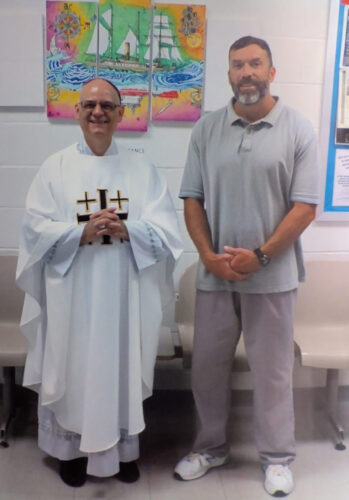
Lance Shockley visited with Archbishop Mark S. Rivituso earlier this year during one of then-Bishop Rivituso’s regular visits to celebrate Mass and offer sacraments at Potosi Correctional Center.
Summer, 27, talks to her father on the phone every other day — if not every day — and visits him every two weeks or so, working around her schedule as a softball coach at Missouri S&T in Rolla.
“In the position that he’s in, usually that person’s not the stronghold of the family, but he truly is,” she said. “Everybody in our family that gets to go and see him looks forward to being able to sit down and have Bible studies during visits, looks forward to having him pray for us over the phone.”
Summer has done her best to follow her father’s example. As a coach, she has the opportunity to mentor her team members, as well as family and friends; if her father can have such a positive impact on those around him while living in a less than ideal situation, then how much can she share God’s love with those around her?
Her father’s death sentence has been looming overhead through it all. She tried to put it out of her mind in the day-to-day, but it cropped up whenever she thought of the future — hoping he would live long enough to see her graduate college (he did), get married (yes, last year), meet her future children.
When she found out the news in June that his date had been set, it “put everything into perspective,” she said.
First, she was grateful for the years they’ve had together. But it’s hard to ever feel prepared for your dad to die, especially in this way, she said.
“You’re in constant grief, but in constant hope as well, hoping that that day doesn’t come, but knowing that if it does, we’re still going to be OK, and that he’ll be with Jesus and that we will see him again,” she said.
They still talk about good things happening — things they’re looking forward to — but there’s also details to discuss about how the day of his execution will go, what his funeral will look like.
If it proceeds as scheduled, Summer, her younger sister and other family members will be there. She’s still praying about whether she wants to be in the room as he dies.
“It feels really unbearable, I guess is the only word I can think up, knowing that I have to grieve until the day it happens, and then after that, we have to find a new normal to know what it will be like to live without him and without his mentorship in my life,” she said. “And just everyone else that looks up to him, how it will affect so many people — it’s not just his family that it’s affecting. It’s every single person that he’s been in contact with.”
That’s what worries Lance Shockley most.
His prayer now is direct: To be spared from execution on Oct. 14.
“If I die…” he paused. “I don’t know if you can call your own death a tragedy, but — it’s not because I’m so great, but because a lot of people are going to be hurt by it — my family, the people I know here in this prison and have known.”
Recounting the deeds of the Lord
After Shockley’s execution date was set, two fellow inmates shared with him, on separate occasions, the same Bible verse: Psalm 118:17.
“I shall not die, but live, and recount the deeds of the Lord.”
“I don’t even have to read it anymore, because it’s written on my heart. It’s what keeps me going every single day,” Shockley said. “I’m ready for the second part of the verse that says ‘recount the deeds of the Lord.’ I’m ready to tell all these pieces and how He saved me.”
Even while in the solitary confinement cell block, where he has been since his death warrant was issued, Shockley has been allowed to come out of his cell and lead a Scripture study for the other inmates on the block, who open their meal slots to be able to listen to him.
“There’s lots more I want to do,” Shockley said. “I want to be about that Kingdom business.”
Deacon Andy Daus, a longtime prison chaplain, continues to visit with Shockley as the date draws nearer. He met Shockley on that first Kairos retreat and has formed a friendship with him in the years since, growing to trust him as a partner in ministry as he witnessed the way he related to those around him.
A person with a death warrant is moved from Potosi Correctional Center to the Eastern Reception, Diagnostic and Correctional Center in Bonne Terre for the actual execution, a practice started because it was too hard on the guards who had gotten to know the inmate over the past 10-20 years, Deacon Daus noted.
Deacon Daus witnessed Jeffrey Ferguson’s execution in 2014 and has seen the effect that executions have on the rest of the men in prison and the people who know them. “You feel empty afterward. You’d seen it happen, and you’re questioning — what good did that do?”
Deacon Robert Shipp, who serves at Our Lady of Providence in Crestwood and Annunciation in Webster Groves, met Shockley in 2019 when he started volunteering on Kairos retreats.
On a recent retreat, a participant shared with the group that he was having a really tough time. On the next break, Deacon Shipp witnessed Shockley pull the man aside to speak with him, encouraging him to persevere and assuring him of God’s love.
Even inside a maximum security prison, Shockley is engaged in the work of evangelization, Deacon Shipp said. “It just points to the love God has for us, and that we just have to embrace it, and it will change our lives, no matter where we are.”
Deacon Shipp’s own views on the death penalty evolved over the years, he said. The difference was Jesus — the closer he grew in relationship with Him, the more he desired mercy and an end to state-sanctioned killing.
“One man, the judge, imposed a death sentence on Lance. So my hope is that one man, the governor, can (give) clemency after reviewing the case,” Deacon Shipp said. “And not only for Lance…but abolish the death penalty. There’s no reason for it. They’re incarcerated for life, and they can do good. Lance is proof of that.”
Shockley’s execution is scheduled on Michael Doak’s birthday, Oct. 14. Doak grows emotional when he thinks of the legacy Shockley will leave behind for him and many others.
“He’s changed my whole life. My kids have a dad, and they’re that much more statistically better now because of that, and then that will ripple effect to their kids and their kids. The ripple effect this man has had on people in a positive manner just by (meeting) them in prison — it doesn’t make sense for the government to kill an asset that is helping people rehabilitate,” he said. “…All you’re doing is creating more victims.”
“He’s one of the best people I’ve ever met in my life. He’s such a good person, and for us to kill him is just unreal. With my tax dollars, that I’m paying, you’re going to kill my friend?” he continued. “It’s heartbreaking.”
“I promise you the world is not better off by executing this man.”
Learn more about Lance Shockley’s case and sign a petition asking Gov. Mike Kehoe to grant him clemency at istandwithlance.com.
>> Church teaching on the death penalty
Recourse to the death penalty on the part of legitimate authority, following a fair trial, was long considered an appropriate response to the gravity of certain crimes and an acceptable, albeit extreme, means of safeguarding the common good.
Today, however, there is an increasing awareness that the dignity of the person is not lost even after the commission of very serioius crimes. In addition, a new understanding has emerged of the significance of penal sanctions imposed by the state. Lastly, more effective systems of detention have been developed, which ensure the due protection of citizens but, at the same time, do not definitively deprive the guilty of the possibility of redemption.
Consequently, the Church teaches, in light of the Gospel, that “the death penalty is inadmissible because it is an attack on the inviolability and the dignity of the person,” and she works with determination for its abolition worldwide.
Catechism of the Catholic Church, 2267
Subscribe to Read All St. Louis Review Stories
All readers receive 5 stories to read free per month. After that, readers will need to be logged in.
If you are currently receive the St. Louis Review at your home or office, please send your name and address (and subscriber id if you know it) to subscriptions@stlouisreview.com to get your login information.
If you are not currently a subscriber to the St. Louis Review, please contact subscriptions@stlouisreview.com for information on how to subscribe.

